PARTICIPANTS

Activism
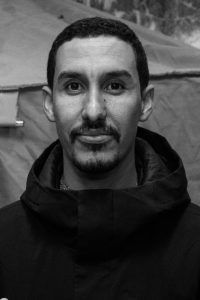
Mohamed Sleiman Labat
Mohamed Sleiman is one of the most internationally recognized Sahrawi artists. He is the founder of the MOTIF art studio in the Sahrawi refugee camp of Smara in Algeria. His art portrays social, political, and environmental issues that impact his community and the world.
Mohamed experiments with discarded materials found in the camp to create meaningful visual pieces. He also facilitates intergenerational learning through the arts, particularly focusing on preserving traditional storytelling and oral history. The studio has become a hub for artistic practice in the remote desert, simultaneously serving as a space for young Sahrawis to acquire skills and explore their creative potential. He has directed films such as The year of balls, Western Sahara Land of Mines, and Desert PHOSfate.
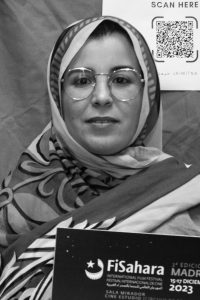
Yaguta El-Mohtar
Sahrawi activist affiliated with UJSARIO (Union of the Youth of Saguia el-Hamra and Rio de Oro). Yaguta is also a climate activist advocating for the representation of the Sahrawi people in climate summits and working to raise awareness about the effects of the crisis on her people. Last December, she attempted to attend the Climate Summit in Dubai (COP28), accredited by UN Women, but she was detained in Paris for several hours due to being Sahrawi and ultimately did not obtain authorization to travel to COP28.

Lurdes Pires
In 1975, when Indonesia invaded East Timor with a green light from US Secretary of State Henry Kissinger, Lurdes was a member of the Timorese FRETILIN resistance movement’s youth section. She accompanied a group of five Australian journalists who were covering Indonesian incursions into then-Portuguese Timor and narrowly escaped the massacre in the town of Balibó, where the journalists, later as the “Balibó Five”, were killed by the Indonesian military. Following the invasion, Lurdes and her family fled to Australia and she became a resistance activist during the 24 year-long occupation of Timor. She was instrumental in setting up Radio Maubere, the secret and illegal radio link between Darwin and the guerrilla fighters in the mountains of Timor. Lurdes was producer, script editor, and advisor on the film Beatriz’s War. She recently co-directed Circle of Silence, a feature documentary about the murder of “the Balibo Five”. She is now completing development on an eight part drama series, Clandestina, about her life and work.
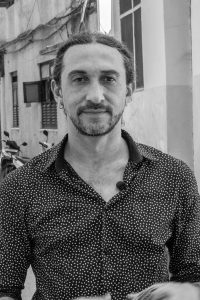
Salym Fayad
Co-director of the MUICA Itinerant African Film Showcase in Colombia and co-founder of the Otro Sur Foundation, an independent organization that promotes cultural exchange between Africa and Latin America. Cultural manager and consultant for South-South connection projects, photographer, and correspondent based in Johannesburg, South Africa.

Tone Sørfonn Moe
Norwegian lawyer and member of the Norwegian Support Committe for Western Sahara. She has worked on human rights cases from the occupied territories of Western Sahara the last six years, having represented several Saharawi political prisoners, human rights defenders, journalists and students in front of the UN. She has worked on cases of violence against women and has served as legal counsel for Sultana and Luara Jaya since November 2020.
Culture

Carolina Yuste
Actress and committed creator. Born in Badajoz, she pursued her studies at the Real Escuela Superior de Arte Dramático and at the Centro de Investigación Teatral La Manada. Among her notable theatrical works are Hablar por Hablar directed by Fernando Sánchez Cabezudo, Suaves by Gon Ramos, and Prostitución directed by Andrés Lima.
She has also participated in various audiovisual projects such as Carmen y Lola by Arantxa Echevarría (Goya for Best Supporting Actress 2019), Hasta el cielo by Daniel Calparsoro, El cover by Secun de La Rosa, Chavalas by Carol Rodríguez, Sevillanas de Brooklyn by Vicente Villanueva, Girasoles Silvestres by Jaime Rosales, and Saben Aquell by David Trueba. In 2020, she wrote and directed Hamsia alongside Enrique Cervantes, a project about eating disorders. She co-directed with Sara Sierra Don’t Fuck With Carrie, a theatrical monologue about bullying in schools. In 2024, she premiered her first documentary short film, Ciao Bambina, with Afi Gnecco, focusing on trans masculinities and their oppression.

Nathalie Poza
Nathalie Poza trained as an actress at the Cristina Rota School. As a co-founder of the Animalario company, she performed in productions such as Titus Andronicus (awarded Best Supporting Actress in Theater by the Actors’ Union and the Villa de Madrid Award for Best Actress). Some of her recent theater works include Prostitución (Andrés Lima) and A cielo abierto and Fuegos (José Mª Pou).
She won her first Goya Award for Best Leading Actress in 2018 for her role in No sé decir adiós, directed by Lino Escalera. Nathalie has collaborated with renowned Spanish directors such as Jon Garaño and Aitor Arregi on Marco, Alejandro Amenábar on Mientras dure la guerra, Icíar Bollaín on La boda de Rosa (Silver Biznaga for Best Supporting Actress and Goya Award for Best Supporting Actress in 2021), Manuel Martín Cuenca on Malas temporadas, and Mariano Barroso on Todas las mujeres. Additionally, she has worked under the direction of internationally acclaimed directors such as Pedro Almodóvar and Woody Allen in Rifkin’s Festival. Recently, she starred in the film Honeymoon, directed by Enrique Otero.
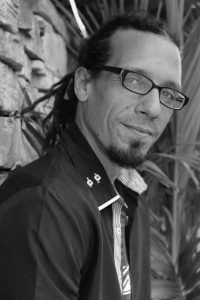
Milton Carrero
Puerto Rican singer-songwriter and journalist. As a special correspondent for the Los Angeles Times, he reported on the aftermath of Hurricane Maria in Puerto Rico and the historic protests of the summer of 2019. He is the author of the screenplay and composer of the songs for the musical Calle de la Resistencia. Alongside his sister, Maritxell Carrero, he is a co-founder of Carrero Creatives.
He has participated in various international music festivals, including Cosmic Convergence in Lake Atitlán (Guatemala), Musikfest in Bethlehem (Pennsylvania), and the Festival Música Medicina in its editions in Puerto Rico and Colombia. His second album, Dentro de una Cueva, was recorded with gypsy musicians in the Sacromonte Caves in Granada (Spain). Currently, he works as a teacher at a Montessori school in Mayagüez (Puerto Rico), the city where he grew up.
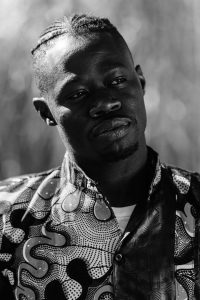
Thimbo Samb
Thimbo Samb is an actor and Artivist. He arrived in Spain from Senegal on a makeshift boat at the age of 17 and had to face a difficult life of overcoming with one single goal: to make his dream of becoming an actor a reality.
He has participated in short films such as Un lugar mejor (2012) and Barcelone ba barsakh (2014), where he was awarded Best Actor at the Castilla la Mancha Film Festival. He has also been involved in documentaries like Makun (No llores)– Dibujos en un C.I.E. (2019), which won the Amnesty International Abycine contest and was nominated for Best Documentary Short Film at the 2020 Goya Awards. He can also be seen in La puerta azul (2013) or El silencio del pantano (2020), Perdida, and in projects like Black Beach (2020) or the series Antidisturbios. Currently, he is shooting the thriller Fuerza de Paz for TVE. And that’s not all. His social media profiles also have thousands of followers. And he has just premiered his theater play EL SUEÑO ES VIDA!
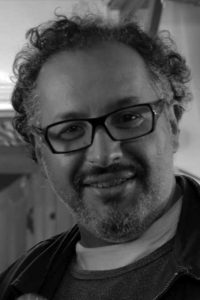
Khaled Habib El Kebich
Khaled Habib El Kebich, born on January 24, 1970, in Tiaret, Algeria, is a distinguished film director, composer, singer-songwriter, and actor. His profound dedication to cinema and music has garnered him international acclaim and recognition. El Kebich’s cinematic journey began at a young age, directing short and medium-length films. His documentary Knights of the Fantasia also known as El Aalfa, received worldwide acclaim. Renowned for his ability to capture reality and explore abstract themes, his masterpiece The Rug offers viewers a poetic journey through Algerian art and heritage.
Beyond filmmaking, El Kebich is an accomplished composer for films and theater. He actively promotes cultural exchange through participation in festivals worldwide, enriching global dialogue and understanding.

Pedro Pastor
At just 29 years old, Pedro Pastor represents and leads a new generation of singer-songwriters in Spain. The son of singer-songwriter Luis Pastor and nephew of Pedro Guerra, he already has over thirteen years of experience on stage, with more than 700 concerts in over seventeen countries across Europe and Latin America.
His music bridges both continents with lyrics that serve as a hymn to change and rebellion, to love and learning, to mixing and fusion, as the main source of musical and human development. In his style, cumbia, funk, African music, or Latin American folklore coexist, without losing the strength and essence of the singer-songwriter tradition and its message. His discography includes Aunque Esté Mal Contarlo (2012), La Vida Plena (2014), Sololuna (2017), Solo Los Locos Viven La Libertad ft. Suso Sudón (2018), Vulnerables (2019), Vueltas (2021), and Escorpiano (2024).
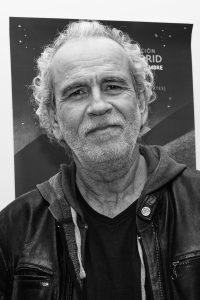
Guillermo Toledo
Actor and theater producer, trained at the Cristina Rota School, where he coincided with Ernesto Alterio and Alberto San Juan, with whom he co-founded the theater company Animalario. He has appeared on television in the popular sitcom Siete Vidas. Nominated twice for the Goya Awards for El otro lado de la cama and Crimen Ferpecto, he has appeared in titles such as Morirás en Chafarinas, Juana la Loca, Días de fútbol, Los amantes pasajeros, and Los favoritos de Midas.
More recently, he has worked on television series such as Maricón Perdido, El grito de las Mariposas or Romancero, having produced the short film 8 de Febrero. He is the co-author of Razones para la rebeldía with a foreword by Julio Anguita.
Politics
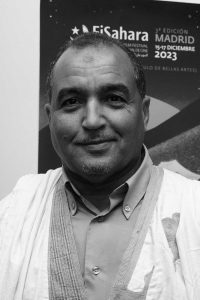
Musa Salma
Politically involved since his youth, Salma served as the Secretary General of the Union of the Youth of Saguia el-Hamra and Rio de Oro (UJSARIO). Later, he was appointed Minister of Youth and Sports of the Sahrawi Arab Democratic Republic (SADR), participating in the coordination of initiatives such as the Holidays in Peace Program or the Sahara Marathon. More recently, in 2023, he took over the portfolio of Culture, advocating for Sahrawi cinema as a cultural tool for social change.
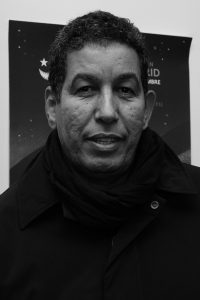
Abdulah Arabi
Abdulah earned a Degree in International Political Relations from the International Institute of International Relations (ISRI) in Havana, Cuba. He worked at the Sahrawi Commission for the Referendum (COSAR) from 1991 until late 1995, when he joined the Central Delegation of the Sahrawi for Spain. He has held positions as Sahrawi Delegate in the Community of Madrid, in Catalonia, in Castilla y León, and in the Basque Country.
Since January 2020, he has served as the Sahrawi Delegate for Spain, coordinating and informing various political and social institutions about the developments in the Western Sahara conflict and strengthening the friendship and cooperation between the Sahrawi people and the people of Spain.
Journalism
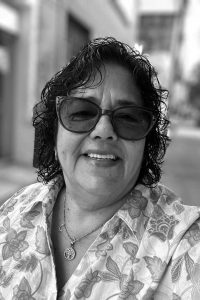
Soraya Bayuelo
Colombian social communicator, journalist, and cultural manager. Co-founder of the Montes de María Audiovisual Festival. National Peace Prize recipient in 2003, she participated in the third Delegation of the 60 Victims who attended the Peace Talks in Havana, Cuba.
She works in the management and promotion of communication projects for social change and journalism for community development in areas affected by the Colombian armed conflict, specifically in the Montes de María Region. Currently, she accompanies processes of audiovisual content production and the construction of Historical Memory through the Itinerant Museum of Memory and Identity of the Montes de María, as a platform for symbolic reparation for the conflict’s victims. Distinguished in 2016 by the Leadership for Colombia Foundation as one of the 28 Best Leaders of Colombia, she was also a National Journalism Prize recipient. She is a co-author of several books.
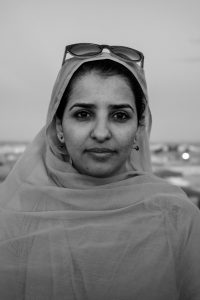
Asria Mohamed
Asria is a Sahrawi human rights defender, journalist and artist, born and raised in the Sahrawi refugee camps. Now based in Oslo, for the last decade she has been advocating for the Sahrawi cause in Norway, doing more than 1,000 public speaking events. Asria is the host, and the producer, of the first podcast on the issue of Western Sahara, in both Norwegian and English. In addition to her work in advocacy, she has been collaborating with several filmmakers and artists. In 2023 Asria wrote the biography of 19 Sahrawi female human rights defenders as part of her art and human rights storytelling project, Jaimitna.

María Carrión
María Carrión is a journalist specializing in human rights and cultural action. She is the Executive Director of FiSahara and co-founder of NomadsHRC, an NGO based in Madrid focused on film, culture, communication, and human rights projects in Western Sahara.
Previously, María worked for the American news program Democracy Now! and was a correspondent in Washington for the newspaper El Observador. She has collaborated as a journalist in numerous media outlets including The Progressive, BBC Radio, El País, Televisión Española, and Diario/Cambio 16. María has worked on several documentaries as a producer, researcher, and scriptwriter, including La espalda del mundo and Condenados al corredor by Javier Corcuera, and Granito: How to Nail a Dictator by Pamela Yates and Paco de Onís.




